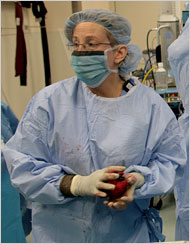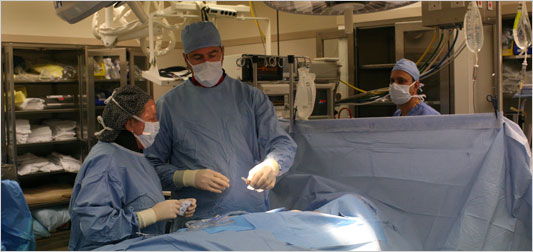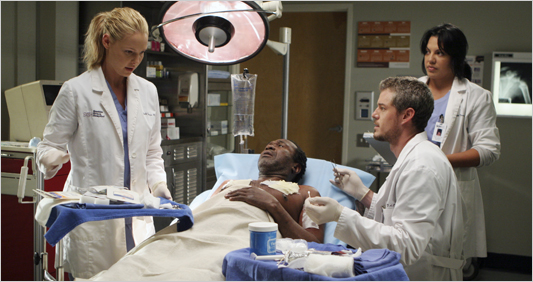October 22, 2008, 11:37 am
A simple Sharpie pen is emerging as an effective tool to prevent surgical errors and infections.
Surgeons typically use marking pens to ensure they operate on the correct part of a patient’s body. But one concern is that the germs from the pen could pose a risk for infection. As a result, many hospitals use sterile pens once and throw them away, a practice that costs thousands of dollars a year.
Infection control experts from the University of Alberta decided to study pens used to mark up surgical patients. They compared a one-use sterile surgical pen to a standard Sharpie — the brand name for a line of no-smudge permanent markers favored by everyone from autograph-writing football stars to President Bush.
In a controlled experiment, the tips of both kinds of pens were heavily contaminated with four types of bacteria that can cause surgical site infections, including two germ types that are resistant to antibiotics. The researchers recapped the markers and allowed them to sit for 24 hours. Read more…
June 3, 2008, 1:09 pm
If you’re thinking about knee replacement, don’t miss my colleague Jane Brody’s update on her artificial knees, three years after surgery.
You may remember the first round of columns Jane wrote about her artificial knee surgery, which caused quite a stir among doctors and knee device makers. Jane recounted her pain and difficult recovery, noting that doctors do a poor job preparing patients for the weeks and months after surgery. Not every knee patient has as difficult a recovery as Jane, but many patients I’ve interviewed over the years agree doctors need to do a better job telling patients what to expect.
But today Jane gives us insights into life with new knees. Among her experiences:
- Her new knees have hiked in Tasmania and Sydney, and toured Vietnam by bicycle, all pain-free.
- Kneeling is problematic. It can hurt to put weight on metal knees, even on a cushion, making activities like gardening a challenge.
- Falling on an artificial knee can hurt a lot more and longer than you might expect.
- Steep steps are difficult to navigate.
- Jane still “feels” her knees on every rotation of the bike pedals, although the sensation is not painful or enough to stop riding.
- Artificial knees are metal and set off the security alarm at airports, requiring a personal scan with a wand.
To learn more about life with new knees, read Jane’s full column here. To read the original columns on Jane’s double knee replacement surgery and efforts to manage the pain, click here and here.
May 28, 2008, 2:17 pm
 When compared with a neutral, unmodified face, left, a face with elevated eyebrows, center, was perceived as sad and tired. A face with lower eyebrows, right, was more often seen as angry or disgusted.
When compared with a neutral, unmodified face, left, a face with elevated eyebrows, center, was perceived as sad and tired. A face with lower eyebrows, right, was more often seen as angry or disgusted.Has anyone ever told you that you looked sad or tired when you weren’t? If the problem isn’t your mood, it might be your face, according to a study in the medical journal Plastic and Reconstructive Surgery.
Yale University researchers set out to determine how facial features like eyebrow shape, eyelids and wrinkles affect facial expressions. They took a photo of a woman’s eyes and digitally altered it to change the eyebrow or lid shape or add wrinkles. After producing 16 different versions of the same face, they asked 20 study participants to rate, on a scale of 0 to 5, the presence of seven expressions or emotions: tiredness, happiness, surprise, anger, sadness, disgust and fear.
What was surprising about the study is that many of the pictures that mimicked various plastic surgery procedures, such as eyelid surgery or brow lifts, actually generated worse scores, with study participants rating those faces as looking angry or tired. Read more…
April 3, 2008, 12:55 pm
Despite national campaigns encouraging patients to take an active role in improving hospital safety, many patients aren’t comfortable asking doctors challenging questions about their care, a new report shows.
 (Jeff Swensen)
(Jeff Swensen)British researchers gave surveys to about 80 surgical patients asking them how they would feel about asking doctors or nurses various questions. The questions ranged from simple factual questions like, “How long will I be in the hospital?” to more challenging questions such as, “Have you washed your hands?” The patients were asked to rate their level of willingness to ask the questions on a scale of 1 to 4, with 4 indicating they would be very willing to pose the question to their doctor or nurse. Read more…
February 27, 2008, 10:22 am
Patients often rely on religious faith to help them cope with illness. But for Milwaukee surgeon Dr. Bruce H. Campbell, operating on a Jehovah’s Witness rattled his own faith in himself.
Dr. Campbell tells his story in an article called “Listening to Leviticus” that appears in this week’s Journal of the American Medical Association. It starts off as a detailed look at a surgeon’s efforts to remove a tricky tumor from a patient’s thyroid gland. The reader senses Dr. Campbell’s growing unease as the baseball-size tumor refuses to yield.
The reason for his distress, explains Dr. Campbell, is that his patient is a Jehovah’s Witness, a faith that forbids blood transfusions. Before the surgery, his patient ordered him in no uncertain terms that he was not to be given blood in an emergency. Read more…
February 15, 2008, 10:50 am
Women appear to delay knee replacement surgery longer than men, and often show up far more disabled by the time they undergo the procedure.
 How long can you stand the pain? (Tony Cenicola/The New York Times)
How long can you stand the pain? (Tony Cenicola/The New York Times)The gender differences among knee replacement candidates is cause for concern because far more women than men suffer from osteoarthritis, which can wear down the cartilage in knees and leave sufferers with bone-on-bone rubbing and agonizing pain. Patients are typically advised to delay knee replacement as long as possible because titanium knee parts eventually wear out too. By delaying the treatment, the patient ideally will die a natural death before replaced knees wear out again.
But doctors now say they may need to rethink that advice because women appear to take it to the extreme. Read more…
February 12, 2008, 6:22 pm
Americans are spending more money than ever to treat spine problems, but their backs aren’t getting any better.
Those are the findings of a report in the Journal of the American Medical Association, which found that United States spending on spine treatments totaled nearly $86 billion in 2005, a rise of 65 percent from 1997, after adjusting for inflation. Even so, the proportion of people with impaired function due to spine problems actually increased during the period, even after controlling for an aging population.
“You’d think if you’re putting a lot of money into a problem, you’d see some improvements in health status,’’ said lead author Brook I. Martin, research scientist at the University of Washington’s department of orthopedics and sports medicine. “We’re putting a lot of money into this problem, and it’s a big investment in health care expenditures, but we’re not seeing health status commensurate with those investments.’’
The report is the latest to suggest the nation is losing its battle against back pain, and that many popular treatments may be ineffective or overused. Read more…
February 5, 2008, 11:07 am
Last year, 218,000 men were diagnosed with prostate cancer, but nobody can tell them what type of treatment is most likely to save their lives.
Those are the findings of a troubling new report from the Agency for Healthcare Research and Quality, which analyzed hundreds of studies in an effort to advise men about the best treatments for prostate cancer. The report compared the effectiveness and risks of eight prostate cancer treatments, ranging from prostate removal to radioactive implants to no treatment at all. None of the studies provided definitive answers. Surprisingly, no single treatment emerged as superior to doing nothing at all.
“When it comes to prostate cancer, we have much to learn about which treatments work best,” said agency director Carolyn M. Clancy. “Patients should be informed about the benefits and harms of treatment options.” Read more…
January 29, 2008, 4:01 pm
Whether a woman receives radiation treatment after breast cancer surgery may be influenced by the gender of her surgeon, according to a new report from The Journal of the National Cancer Institute.
 The gender of your surgeon may impact your treatment. (Fred Conrad/The New York Times)
The gender of your surgeon may impact your treatment. (Fred Conrad/The New York Times)The study, from researchers at Columbia University, set out to determine why breast cancer treatment still varies among similar patients. In particular, they looked at radiation treatment given to women after lumpectomy. The treatment is considered a standard of quality cancer care and has been shown to reduce breast cancer recurrence and mortality. However, many women still don’t receive it.
Earlier studies have suggested that demographic characteristics influence whether a woman receives postsurgical radiation. A patient’s race, age and how far she lives from a radiation therapy facility all are factors that affect her chance of receiving the treatment.
But the latest report looked at the doctors behind the decisions. Read more…
January 14, 2008, 10:32 pm
For men facing prostate cancer, their first worry is about dying. Often, their second worry is whether the treatment will kill their sex life.
But men researching the odds encounter a myriad of confusing information. Depending on what study you read, you might read that anywhere from 30 percent to 97 percent of men return to potency after prostate cancer surgery. But as my Well column in Tuesday’s Science Times explains, the chance of a normal sex life after surgery depends on a number of variables. A man’s sex life before surgery, whether he has a supportive partner, the stage of his cancer, and even how a surgeon defines potency all will influence the odds he is given by his doctor.
Have you or someone you care about had surgery for prostate cancer? Did your sexual recovery match your expectations? Or has it been better or worse than you expected? Read the full column here, and please post your comments below. I look forward to hearing from you.
January 14, 2008, 11:20 am
 (Credit: Fred Conrad/The New York Times)
(Credit: Fred Conrad/The New York Times)What kind of music is played in the operating room? Why don’t you ever see surgeons wearing their stethoscopes? These and other pressing questions are answered in an interesting blog post from University of Virginia medical student Mark Hoofnagle, written after his first week on a surgical rotation.
Here’s some of what he learned. Read more…
December 11, 2007, 1:01 pm
 A boy being circumcised recently in Algeria. Circumcision practices vary widely across the world. (Fayez Nureldine/Getty Images)
A boy being circumcised recently in Algeria. Circumcision practices vary widely across the world. (Fayez Nureldine/Getty Images)Circumcision is the most common surgical procedure performed in the United States. But does it violate the human rights of baby boys?
That’s the provocative question raised this month by The British Medical Journal, which published a debate between two physicians about the benefits, risks and social reasons behind circumcision. Some medical experts view circumcision as a potentially important medical intervention for stopping the spread of AIDS. Last year, a report showed that the procedure appears to reduce a man’s risk of contracting AIDS from heterosexual sex by half.
Around the world, about 30 percent of men are circumcised, and most were circumcised in infancy. Circumcision is more common in English-speaking and Muslim countries. In the United States, about 70 percent of men are circumcised, although rates vary by race and ethnic group, according to a September study in PLoS One. That same study suggested circumcision rates in the United States are on the decline as parents begin to debate the medical vs. cultural reasons for seeking the procedure. Read more…
November 28, 2007, 1:10 pm
 Your left or my left? (AP Photo/Paul W. Gillespie)
Your left or my left? (AP Photo/Paul W. Gillespie)It sounds like something out of a horror movie, but wrong-sided surgery happens more often than you think.
Concerns about surgeons operating on the wrong part of the body made headlines this week after The Providence Journal reported that on three separate occasions this year, surgeons at Rhode Island Hospital operated on the wrong side of a patient’s head. The most recent case happened last Friday, when the chief resident started to cut on the head of an 82-year-old patient. The resident, a doctor in the seventh year of specialty training, realized the error before reaching the skull and closed the wound with a single stitch. The procedure was done on the correct side, “with good results,” according to a statement from the hospital, which was fined $50,000 by the state health department. Read more…
November 5, 2007, 1:37 pm
 A scene from “Grey’s Anatomy.” (ABC/Michael Desmond)
A scene from “Grey’s Anatomy.” (ABC/Michael Desmond)Medical shows have long been a staple of prime time television. But how well do they reflect what really happens at the hospital?
That’s the question tackled in the current issue of Stanford Medicine Magazine, a publication of the university’s medical school. Many doctors are hooked on TV medical dramas, according to the magazine, but they have a “love-hate relationship” with their television counterparts.
Often the doctors aren’t concerned about the technical details of such popular shows as “Grey’s Anatomy” and “ER.” Instead, many take issue with the day-to-day goings-on and the misimpression that medical professionals have lots of time to socialize and kindle hospital romances. Read more…
October 19, 2007, 6:51 am
While the Internet has given patients unprecedented access to medical information, it’s also given doctors the chance to express themselves beyond the exam room. Read more…


















 Healthy living doesn't happen at the doctor's office. The road to better health is paved with the small decisions we make every day. It's about the choices we make when we buy groceries, drive our cars and hang out with our kids. Join columnist Tara Parker-Pope as she sifts through medical research and expert opinions for practical advice to help readers take control of their health and live well every day. You can reach Ms. Parker-Pope at
Healthy living doesn't happen at the doctor's office. The road to better health is paved with the small decisions we make every day. It's about the choices we make when we buy groceries, drive our cars and hang out with our kids. Join columnist Tara Parker-Pope as she sifts through medical research and expert opinions for practical advice to help readers take control of their health and live well every day. You can reach Ms. Parker-Pope at 

